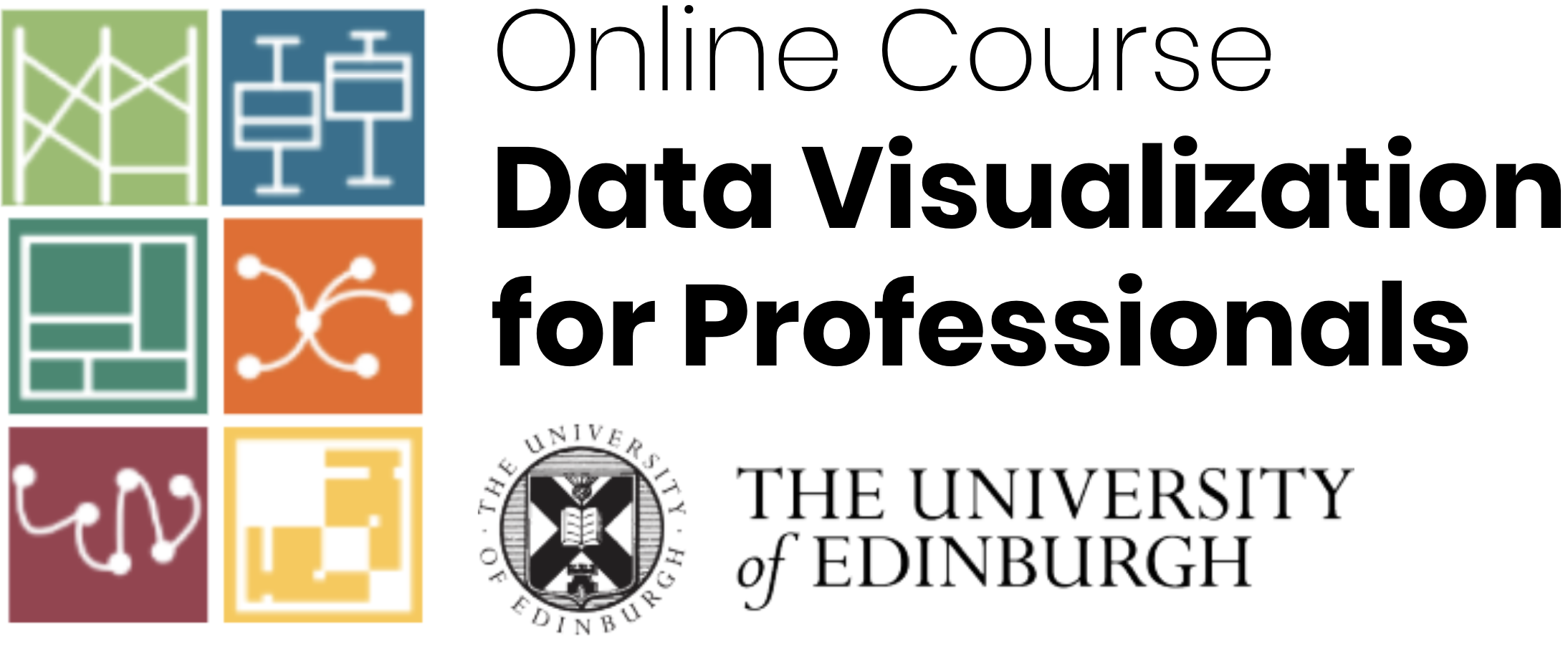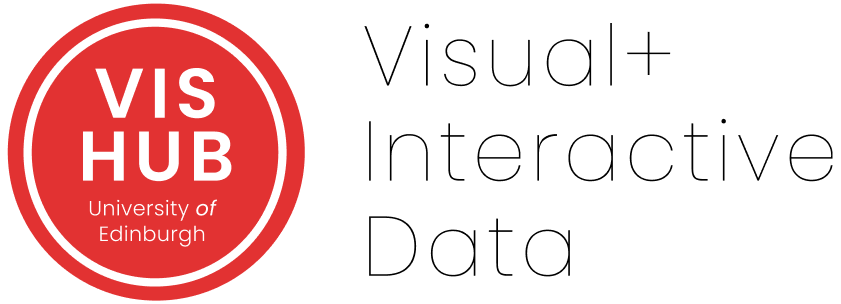
This is an online course on data visualization for upskilling professionals in all sectors running 16. May – 10. July 2022
Navigation
OverviewCourse Description
Teaching Approach
Topics & Schedule
Requirements, Fees and Waivers
How to apply
FAQs
Apply
Team
E-mail us

Topics & Schedule
The course is expected to require a total time investment of 5-10h / week, roughly split into
- 1h video material (at own pace)
- 1h reading (optional)
- 2h tutorial (optional)
- 1h Q&A sessions (optional)
- 1-3h individual project work
The course features
- Recorded video lectures, mostly organised into bite-sized chunks of 5-10min, with a few longer videos 20-25min, which can be watched at one’s own pace.
- Reading materials in the form of text book chapters and (easy to understand) scientific papers, associated with topics and lectures.
- Testing your lecture knowledge in quizzes
- Questions about topics will be discussed in general Q&A sessions, once a week.
- 2h live tutorials: While not compulsory, participants are encouraged to take full advantage of these sessions to engage in discussions with peers and invited subject matter and domain experts, and to obtain direct feedback on assignments. These sessions will introduce:
- design and critiquing exercises, as well as
- a selection of free, open source and commercial data visualisation and visual analytics tools, to demonstrate the range of features available, skills required and user support, for deriving insight into data through visual exploration and analysis.
- 1-1 sessions to help with data visualisation briefs, ideally using participants’ own data, create a design to meet the requirements identified, and, within the constraints of the course, build a visualisation-driven solution.
- A Teams channel will support networking and discussions.
- A dedicated forum encouraging discussion and questions on visualisation skills and theory among participants.
Schedule Overview
Each week will focus on one key topic:
- Weeks 1 to 3 focus on mandatory topics, introducing the main concepts of data visualisation.
- Weeks 4 & 5 focus on visualisation techniques for specific data types.
- Week 6 looks at techniques for storytelling with data.
- Week 7 discusses evaluation strategies for visualisation .
- Week 8 is not a taught week. It’s to finish your projects, which are handed in at the end of the week.
Detailed Schedule
Week 1: Introduction and Foundations
Introduction into basics of data visualisation. Why are we using data visualisation? Why does visualisation work? What are forms of visualisation? What is the difference between exploration and explanation. What is of visualisation literacy? The week’s second session introduces the visualizaton design process, basics of design thinking, and understand the idea behind Exploratory Data Analysis (EDA).
The week will see a sketching exercise, and tutorial on basic charts and common flaws in visualisations. You will formulate a visualisation challenge for your class project.
Week 2: Visualisation Design
Basic concepts of visualisation design: data types, visual variables, color, design guidelines.
You will engage in sketching and ideation for your class project.
Week 3: Visualisation Tools
This lecture overviews and introduces common software applications (tools) to help with both: data analysis and the creation of visualisations. We will overview tools for programming environments such as python (e.g., Seaborn) and JavaScript (e.g., D3), but also tools using common user interfaces (e.g., Rawgraph, Datawrapper). The lecture will not teach how to use these tools, but focus on a high-level overview of the many different tools and workflows that exist to create data visualisations.
The tutorial will encourage discussion of visualisation tools with us and peers. We will also run a sneak-preview tutorial on D3.
Week 4: Visualisation Techniques I
Choose between a selection of lectures and readings on
- Basic Charts
- Multidimensional data
- Geographic data
You will work on preparing and exploring your data for your class project.
Week 5: Visualisation Techniques II
Choose between a selection of lectures and readings on
- Networks
- Trees + Hierarchies
- Temporal Data
You will engage in critical analysis of your class project progress.
Week 6: Storytelling
This lecture focuses on effective presentation and communication techniques when using visualisations in e.g., infographics and presentations. Other presentation media can include videos, posters, or data comics. The lecture investigates how presenting and talking with visualisations is different than using visualisations for exploring and analysing data.
In the tutorial, you will have the chance to work on a storyboard for the story you want to tell with your data.
Week 7: Evaluation
This lecture covers techniques to assess if a given visualisation technique (existing or your own creation) is “successful”. Successful is a broad term and refers to both effectiveness and efficiency in which a user or audience are supported in their analysis or understanding of the data. The lecture proposes a simple heuristic, Readability, Understandability, Supportiveness, Truthfulness, Insightfulness and Communication
Week 8
You can use this week to finalise your project and request more 1-1s with the course organisers.